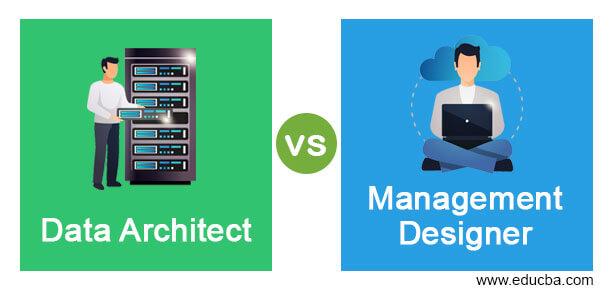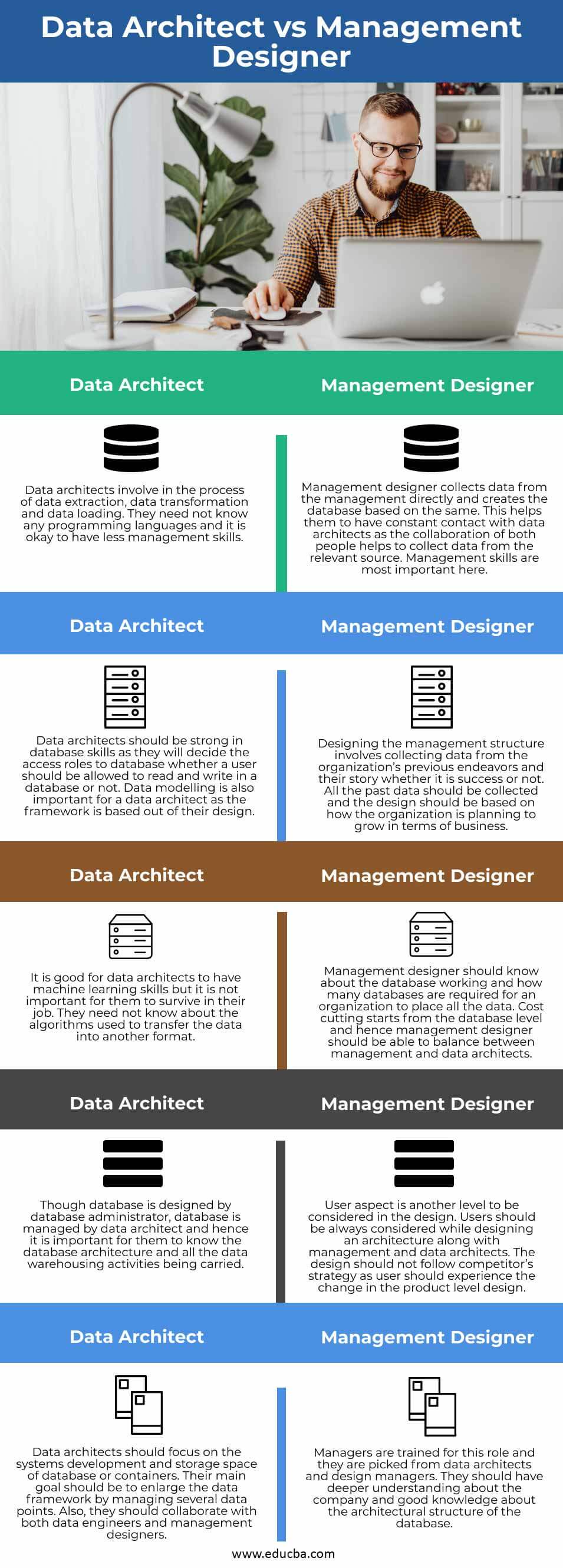Updated March 10, 2023

Introduction to Data Architect and Management Designer
An engineer who follows the data architecture by managing the design and deploying the organization’s needs into the database is called a Data architect. They work with data management systems where a plan is always there with them to maintain the database for all the requirements so that information can be collected from the right place. A field where project management and supply chain techniques are used in the design of any creative process in the organization is called management design and the person who does it is called management designer. The process is collaborative and design is created by inputs from all the team members.
Head to Head Comparison Between Data Architect and Management Designer (Infographics)
Below are the top 5 differences between Data Architect and Management Designer:

Differences between Data Architect and Management Designer
Data architects work with different people in various fields such as data engineers, data scientists, data miners, and data analysts, and therefore their work is mostly with data storage, data visualization, data security, and systems access. Data architect’s role is not purely technical and not completely into the software. Hence, they act as an intermediary between the company’s management and IT department. Management designers work with data architects and the company’s management so that the data inputs from architects should align with the company’s management structure where data should be collected from certain sources and the data should be based on pharmaceutical or structural or whatever that completely depends on management.
Key Differences of Data Architect and Management Designer
- Data architects work closely with data scientists where data analysis is done more actively. A supporting framework is created by data engineers where they will not support any other team but work for themselves. Data architects should need knowledge in database management systems and the way they work and the people with whom they should provide access. Management designers work with the company management more for a better understanding of the company’s policies at the functional and strategic level. The role includes the design of projects and strategic thinking for the company’s future.
- The data framework is made into completion by a Data architect who gives the idea of the same, provides the concepts and various ideas to build it, and visualize the framework to the stakeholders so that the importance of the framework is known to all. Initially, it was difficult to connect structural design with management but as the role evolved based on management, it easily connects with the entire organization, and the position not only does management designs but connects the company with an outside market with more innovative thinking.
- Management designer gives inputs to data architects based on organization’s requirements so that they collect data from the required platform and provides the same to data engineers. The inputs of management designers come from the organization from which they draw the designs and educate the employees about the organization’s goals. This design is taken as the brand name and the company’s product differentiation from other companies in the market. Management designers connect the data architectural design with corporate strategy and functional requirements.
- Data architects should have knowledge about data modelling, warehousing, data algorithms, and database architecture and visualization of data. Management designers should be proficient in management skills along with database design. This design should connect with database architecture which will be looked after by data architects. Teamwork is very important in management design and a collaborative form of working helps in better management designs.
Comparison Table of Data Architect Management Designer
| Data Architect | Management Designer |
| Data architects are involved in the process of data extraction, data transformation and data loading. They need not know any programming languages and it is okay to have less management skills. | Management designer collects data from the management directly and creates the database based on the same. This helps them to have constant contact with data architects as the collaboration of both people helps to collect data from the relevant source. Management skills are most important here. |
| Data architects should be strong in database skills as they will decide the access roles to the database whether a user should be allowed to read and write in a database or not. Data modelling is also important for a data architect as the framework is based on their design.
|
Designing the management structure involves collecting data from the organization’s previous endeavours and their story whether it is a success or not. All the past data should be collected and the design should be based on how the organization is planning to grow in terms of business. |
| It is good for data architects to have machine learning skills but it is not important for them to survive in their job. They need not know about the algorithms used to transfer the data into another format. | Management designers should know about the database working and how many databases are required for an organization to place all the data. Cost cutting starts from the database level and hence management designers should be able to balance between management and data architects. |
| Though the database is designed by the database administrator, the database is managed by the data architect and hence it is important for them to know the database architecture and all the data warehousing activities being carried | The user aspect is another level to be considered in the design. Users should be always considered while designing an architecture along with management and data architects. The design should not follow the competitor’s strategy as a user should experience the change in the product level design. |
| Data architects should focus on the systems development and storage space of databases or containers. Their main goal should be to enlarge the data framework by managing several data points. Also, they should collaborate with both data engineers and management designers. | Managers are trained for this role and they are picked from data architects and design managers. They should have a deeper understanding of the company and good knowledge about the architectural structure of the database. |
Conclusion
It is not always important to have a management designer as a specific role in small companies as this role will be looked after by management itself. But when there is a specific person to connect management goals with data collection, it helps in the company’s architecture overall and manages the team well.
Recommended Articles
This is a guide to Data Architect and Management Designer. Here we discuss Data Architect and Management Designer key differences with infographics and comparison table, respectively. You may also have a look at the following articles to learn more –

